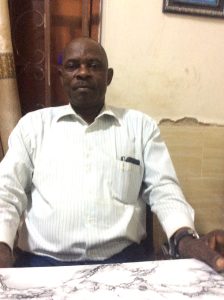Source: www.morningstarnews.org
Date: December 20, 2023
Church members oppressed long ago still paying the price, key leader says.
By Christian Daily International-Morning Star News

The Rev. Abraham Damina Dumus, head of the CAN Bauchi State Chapter. (Christian Daily International-Morning Star News)
BAUCHI, Nigeria (Christian Daily International–Morning Star News) – With a decades-old history of Islamic extremist attacks, Nigeria’s Bauchi state is home to a Christian community that continues to suffer oppression and killings, a long-time pastor said.
While Muslim officials and others drove Christians to the outlying edges of the city of Bauchi decades ago, those areas later became the city center – from which Christians were again forced out and now live far from their worship sites, said the Rev. Abraham Damina Dumus, chairman of the Christian Association of Nigeria (CAN), Bauchi State, and a Baptist pastor.
“In spite of the number of Christian worship places here, Christians do not live here in the city center, simply because of persecution,” Pastor Dumas told Morning Star News. “Christians who own these worship places are forced to live in the suburbs or outskirts of the city.”
Those Christians have been faithful to make the trips back to their church worship services and other programs, he said.
“The dexterity of Christians not to be deterred by Muslim authorities here in Bauchi has made them to remain steadfast, and they have continued to use their worship places,” Pastor Dumas said. “Without the commitment of Christians, these worship places would have been shut down completely.”
At present no Christians live in the old city center of Bauchi, he said.
“Christians who were living inside the old city as tenants were chased out by Muslims,” he said. “They had to move out and live in the outskirts.”
At the same time, the extremism of area Muslims is such that anti-Islamic events elsewhere, including internationally, lead them to vent their fury on local Christians, he said.
“Anytime these Muslims are provoked by events occurring elsewhere, Christians living in the suburbs become their targets of attacks,” Pastor Dumas said. “For instance, the Yelwa area, a Christians suburb where Abubakar Tafawa Balewa University and the Federal Polytechnic, Bauchi, are located, is readily attacked by Muslims any time they feel provoked by events occurring elsewhere, even when they know that Christians in Bauchi state have nothing to do with such events. These areas have been attacked numerous times over the years.”
As part of Nigeria’s northeastern geopolitical zone, where Islamic extremism took root in the early 1990s, Bauchi state has a history of bombed churches and assaults that continue to this day, he said.
“The persecution of Christians in Tafawa Balewa Local Government Area has remained a thorn in their flesh up to this very moment as I speak to you,” Pastor Dumas said. “From 1991 to date, there has been continuous bloodletting by Muslim terrorists targeted at Christians in that area.”
Bauchi state Gov. Bala Mohammed recently expressed concern over a spike in attacks by terrorists whom he said were coming from other states.
“Because of the federal government’s sustained war against bandits and terrorism in other zones of the country, the state is becoming a hiding place for the unscrupulous elements who are beginning to disturb the peace of the citizens,” Mohammed told a meeting of traditional rulers in September. “We have established a Ministry of Internal Security that will partner with the federal government just to drive the issue of providing internal security.”
Armed terrorists cross state borders in their assaults. A police rescue effort in response to a kidnapping in Bauchi state’s Toro County on Nov. 29 resulted in the recovery later that evening of three others who had been kidnapped in neighboring Plateau state, a pastor and two other Christians.
Bauchi state, where sharia (Islamic law) has been instituted as the main body of civil and criminal law since 2001, is estimated to be about 85 percent Muslim. Christians make up about 6 percent of the population, with traditional indigenous religions followed by 9 percent of the inhabitants.
The history of bombings of churches in Bauchi state hit a new level with the birth of the rebel Islamic extremist group Boko Haram in 2009, Pastor Dumas said.
“In three years, 2009-2012, Boko Haram terrorists bombed almost all the churches in Bauchi city,” he told Morning Star News. “Christians’ worship places were bombed on Sundays as Christians gathered for worship services. It was from here in Bauchi that the Boko Haram attacks spread to Maiduguri in Borno state. In these massive attacks against Christians, my house was burned down by the terrorists. Many houses belonging to Christians were also burned down during these attacks.”
Christians in northern Bauchi state, saw their homes and church buildings burned down in Azare, Misau, Danbam, Giade, Zaki and others, and many of them were killed, he said.
“Also in the southern part of Bauchi state, in places like Bauchi, Tafawa Balewa, and the rest, the situation was nasty and ugly to the church,” Pastor Dumas said. “It was like the church was going into extinction as there were clear signs that Christians were not going to exist in Bauchi state.”
In the 2023 World Watch List of the countries where it is most difficult to be a Christian, Nigeria jumped to sixth place, its highest ranking ever, from No. 7 the previous year.
